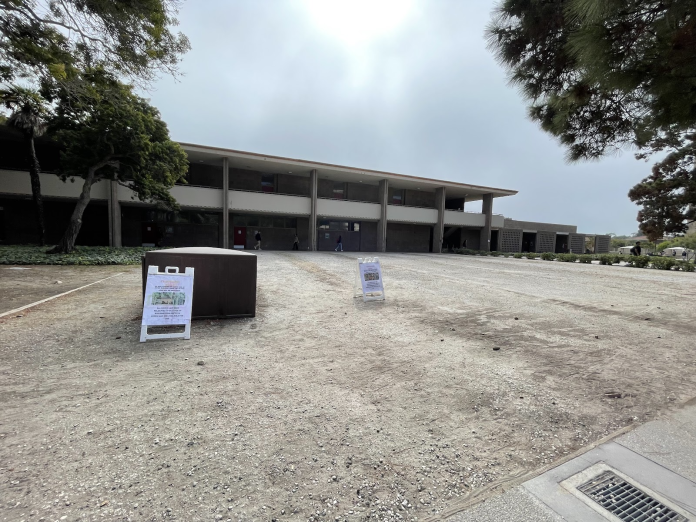Maya Smestad
Staff Writer
Wednesday, Oct. 11 began as a perfectly normal day. I enjoyed an early breakfast that morning, finished some additional homework assignments, and was ready to memorize and regurgitate a boatload of information from my lectures. However, when I arrived at UC Santa Barbara’s (UCSB) Music Building, I couldn’t help but notice the area looked a little empty: the bike racks were missing! In place of the racks stood a single plastic sign: “No bike parking… Bikes left in this area will be impounded. All racks have been relocated.” What was going on?
A map indicated alternate parking spots for bicycles. However, there were few, if any, racks available in the area designated by the sign. Of course, Transportation and Parking Services (TPS) didn’t remove all bike parking near the building: they left several bike racks alongside the Music Building’s north wall, which provided only a handful of spots for bicyclists; they also relocated some of the original bike racks to the east side of the building. However, this incident is indicative of multiple larger issues at hand.
UCSB has been a “green” university for many years. In their vision statement, UCSB Sustainability explains that an oil spill in 1969 prompted a group of faculty to form “The Friends of the Human Habitat.” The program has since evolved through additional departmental positions and incorporation of student representatives. Its recent commitments to sustainability have really shone through; in 2021, UCSB received a gold rating out of a possible platinum from the Sustainability Assessment, Tracking and Rating Systems program (STARS). Over the years, UCSB continues to win sustainability-related awards. As a self-proclaimed advocate and supporter of climate crisis awareness and solutions, I’m glad to be part of a community that actively wants to reduce their carbon footprint. But they have yet to reflect this commitment when it comes to accommodating their current students.
This inability is reflected in the debate over the placement or removal of the Interactive Learning Pavillion (ILP) bike path. Six months ago, the Associated Students (AS) Bike Committee allegedly released a statement on Reddit about this “ongoing” debate, reassuring readers that they “strongly advocated” in favor of an ILP bike path in 2019 when designs were still in developmental stages.
Despite worthy efforts on the part of AS and other students, UCSB made the executive decision to “permanently reroute bikes onto UCen Road,” subjecting bicyclists to two options: risk being fined for biking illegally on non-bike-designated areas, or risk winding up in a car accident on UCen Road’s dangerously unpaved and narrow street. According to a statement by the AS Bike Committee, the decision was made primarily due to faculty and administration members’ concerns that the area has become overcrowded. “The school [decided] to go against what the majority of students agree is necessary,” a user on Reddit commented under AS’s statement. “If they just listened to students in the first place they could have more money to use for other things and the students’ voices would actually be heard.”
Photo by Maya Smestad.
But concerns about the lack of adequate transportation accommodations extend past sustainability. Anyone who has been at the university for more than a year — whether faculty, staff, or student — knows that this is not the first time TPS has angered the UCSB student population. Funded partially by student tuition, they are arguably known best among students for being stingy with parking permits, ticketing when unnecessary, and having hard-to-reach customer service — reflected in more than one hundred Google reviews. Drivers frequently complain, both toward TPS and in general, about a lack of student parking spots that creates opportunities for TPS officers to take advantage of financially struggling students. Other drivers find that they ticket too frequently and are unlikely to accept appeals even if the ticket was filed under an erroneous condition. Many mention how TPS staff are frequently unaware of their own policies, pointing out inaccurate markings of parking spaces, providing drivers with misinformation about where they can safely park without a fine, and making ticketing mistakes. “They just don’t care, and don’t bother to care,” one anonymous user argued in their now-removed Google review. Or, that’s at least what it certainly feels like.
UCSB and TPS certainly can’t satisfy all their students all the time. However, the level of indifference they have demonstrated towards their students’ needs is nothing short of unacceptable. As a student, I am naturally inclined to support student voices and thus feel distraught when I sense that our opinions aren’t being respected. From the perspective of my peers and I, UCSB is pouring students’ and parents’ hard-earned tuition money into advertising to attract prospective students to a picture-perfect “college-by-the-beach” lifestyle. However, once students are admitted, they realize that UCSB has no problem taking selfish actions at the cost of their students’ wellbeing. Many students are having trouble finding bike parking, unable to bike to necessary classes in the ILP, and are being fined unfairly for parking their cars in a limited number of spots. How exactly does UCSB want us to get to school?
The recent lack of adequate bike parking and the buildup of transportation-related events of the past few years as a whole may call UCSB’s commitment to a sustainable future and the overall well-being of their students into question. Focusing copious amounts of energy away from current students leaves little resolution when we are placed in such predicaments created by the institution. And, to add insult to injury, our futures are being decided by faculty members who may not even be here when the drastic effects of the climate crisis set in. Here’s to hoping that TPS and UCSB will realize that if they want to create these inconveniences for students, they have to provide adequate solutions as well.











